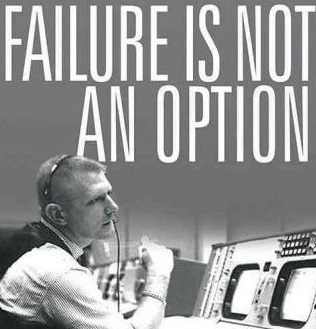One of the best-known lines in the movie Apollo 13 is, “Failure is not an option”, attributed to flight director Gene Kranz*, as played by actor Ed Harris.
You can’t, however, be in new territory, push for innovation, make a prediction of the future and hope to prevent failure. If you are creating your own future, which you are as an entrepreneur, you cannot guarantee success.

The only way to guarantee “zero failure” is if you take no risks. And if you don’t take risks, you can’t expect real gains.
You also can’t simultaneously say you care about developing your employees and then expect them to not make errors. Growth, development and innovation imply testing — testing can occur before your product is in market or when it is in market. Testing will mean some things will work, and some things will not.
We need to be OK with failure as an option – as long as it is done fast, with purpose and with learning.
The risk balance: build to ship early
Opportunity windows can close if you ship only when you aim for the least-risky version or wait for what you think is the perfect product or service. Waiting to ship only when it is “complete” also bets your company on something that’s untested in the market, an option which has its own set of risks.
Much better to ship as soon as you have developed something that you are confident adds value to your customers. That point can be determined as when they are prepared to pay you for what you ship. Then continue to increase value, always measuring true customer interest, engagement, value and feedback. Knowing what your customer uses, how much they use, and why, is much more valuable to your future product or service development plans, and likely to be less risky than any other path.
The risk balance: preparing to learn
In the software development world, this notion of develop fast, deliver often — review, test, fail, learn and refine — is called Agile product development. Yet this approach is applicable more broadly than to just software development.
This means developing the nerve, thinking and processes to work through the obstacles that inevitably arise across any business function, especially when launching something new, or launching as a startup.
Creating a culture that allows for hypotheses, building, shipping, testing — and accepting that some things will fail — actually best balances risk against opportunity. As you move forward, you do more of what works, and stop doing what doesn’t.
In my experience it looks like this:
- start with customers and define a problem statement that directly solves their needs
- test the concept early, and when you have enough research to make an informed decision about scope, commit to building it (whether software, a service, or a product)
- define and commit to the minimum viable version of what you seek to deliver — then get it to market early, in the hands of customers, managing the numbers as you gain feedback and refine
- update, repeat and continuously deliver as you learn and scale
At Digivizer, by way of example, we have evolved an early product iteration into a fully fledged enterprise service offering. Now we are reusing this technology platform, experience and our data to work on the development of a new SaaS software solution that will allow all companies to easily measure the effectiveness of their social and search investment.
We have, in other words, continuously tested our hypotheses about what customers actually need, shipped, earned reviews, and fed back into continuous product development and product offerings.
Embrace, don’t fear, the possibility of failure: it’s a productive option to get you to your ultimate destination faster
The point about the Apollo 13 mission was not so much that failure was not an option but that the entire NASA team had to make quick decisions and act: the overall mission could not be allowed to fail because the consequences (the death of three astronauts) were simply unacceptable. They dispensed with the tried-and-trusted NASA ethos of testing and checking before executing (they had to). They assessed each task and fix on its merits, did quick assessments of risk (often in less than an hour), and (literally) pushed the button. They didn’t have the oxygen, fuel or power to wait for the perfect moment. More than once, they had to rethink their decisions on the fly.
No one wants to fail. No one plans to fail. But accepting that with progress there is also failure means that instead of waiting for that perfect moment, you are now prepared to ship and continuously innovate and deliver. And if you fail, fail fast, learn from the failure, quickly pivot or iterate, and repeat. And never forget to celebrate the wins and learnings along the way.
(*Kranz never actually said this during the mission, although after its use in the movie, he did adopt the phrase for his autobiography.)
This article is also published on LinkedIn.
(Photo source: Tantor via https://audiobookstore.com/audiobooks/failure-is-not-an-option-1.aspx)


